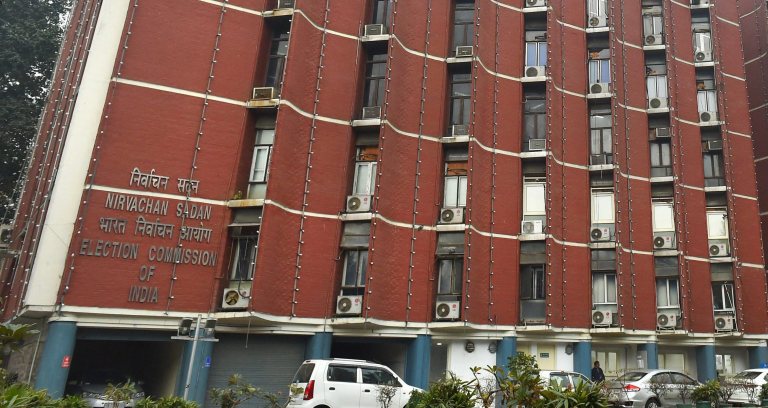
‘Match referee’ Election Commission under cloud, again

A WhatsApp joke doing the rounds goes something like this: The Election Commission will not join the BJP. Instead it has decided to provide outside support to the party.
Though the purpose is to elicit a laugh, the joke is indicative of a deeper problem regarding the credibility of the EC going by its recent rulings which are seen as favouring either the BJP or Prime Minister Narendra Modi and his close aide Amit Shah.
The latest one, adding further fuel to doubts over the EC’s impartiality, has to do with its order to wind up the election campaign in Bengal a day earlier than scheduled.
Following violence between supporters of the BJP and the Trinamool Congress (TMC) in Kolkata resulting in the damage to the bust of 19th century reformer Ishwar Chandra Vidyasagar, and injuries to many caught in the fracas, the EC on Wednesday ordered that campaigning should end at 10 pm Thursday instead of the scheduled 5 pm on Friday.
The point is not about the EC decision per se. Questions are being asked as to why the EC decided to allow campaigning until Thursday 10 pm if it was serious about its assessment that violence had gone out of hand. Shouldn’t it have ordered that campaigning stop from the time it issued the order, on Wednesday?
It transpires that Prime Minister Modi had scheduled two rallies on Thursday which would get over by 10 pm. So, the speculation is that the EC did not want to impede the two rallies. This has cast doubts over whether it is treating all parties in an even manner.
From the time the current election process started the EC’s rulings have been controversial. The very first decision to announce a seven-phase election stretching over 39 days was viewed with suspicion. Many independent observers and opposition political parties claimed that the move was to give a chance to Modi and the BJP to campaign and address meetings in important constituencies including in Uttar Pradesh and Bengal.
With innumerable elections under its belt over the past seven decades, India’s Election Commission is considered an expert and its officials have been invited to several countries to help conduct elections. Moreover, India has a vast number of paramilitary forces who are eminently capable of providing security. In 1980, for example, elections across the country were completed in just three days.
The current seven-phase elections have resulted in a peculiar situation where governments, both central and states, have been unable to carry out normal administrative functions due to the Model Code of Conduct (MCC). This prevents activities, like say drought-related relief programmes which have caused massive tensions in certain states like Andhra Pradesh. Chief Minister Chandrababu Naidu has confronted the EC as he was unable to hold these meetings.
What is high on the list of questions against the EC is the manner in which it has treated violations under the MCC. On March 19, for example, the EC had clearly directed political parties not to use the armed forces in their campaign either directly or indirectly. Yet, there have been a slew of complaints against Modi on this score. The accusation was that he used the Balakot strike to curry favours for the BJP from the electorate.
But the three-member body headed by Sunil Arora gave a clean chit. Again, the EC is entitled to its decisions. What raised eyebrows was the move by the EC not to publicise the dissenting note by one of the fellow-Election Commissioners Ashok Lavasa.
Though Arora was quoted by the Economic Times as saying that the controversy was “highly avoidable” and that he would rely on the “eloquence of silence” that has not been a satisfactory response. Opinion is divided on the issue with some legal experts quoting the practice in court rulings where the dissenting view is appended to the majority judgment.
Arora may have been right but on the larger issue of transparency especially during an election campaign the EC is perceived to have floundered.
At the same time, the EC is seen to have pulled up other politicians in the opposition and lesser mortals in the ruling BJP by handing over time-specified bans for breaching the MCC. For example, Uttar Pradesh Chief Minister Yogi Adityanath, Bahujan Samaj Party (BSP) chief Mayawati and BJP Union Minister Maneka Gandhi besides the party’s candidate in Bhopal Sadhvi Pragya. Even this came about only after the Supreme Court pulled up the EC for not exercising its powers.
Probably to set the record straight, the EC did not allow the screening of the Modi biopic asking it be on hold until elections are complete. At the same time, despite objections from the opposition, it has not issued any orders to stop the NaMo TV channel, which exclusively promotes Modi. While the government has said it is an ad-based platform, the EC has allowed it to telecast live speeches of Modi during the silent period on the eve of elections. The opposition has questioned this ruling as, according to them, it amounts to campaigning when others cannot in the 48-hour period prior to voting.
Besides these instances, there have been a litany of complaints against some of the EVMs, allegations of dysfunction, the way ballot machines have been transported allegedly suspiciously and, according to a Frontline article, the discrepancy in the number of machines manufactured to the number in use. The EC has been unable to provide satisfactory closure to several of these complaints.
The EC rulings are important as they have the potential to be trend-setters that any government or political party can use in future and possibly undermine the conduct and the credibility of the poll process itself. But, from the looks of it, enough damage may have already been done on this score.

